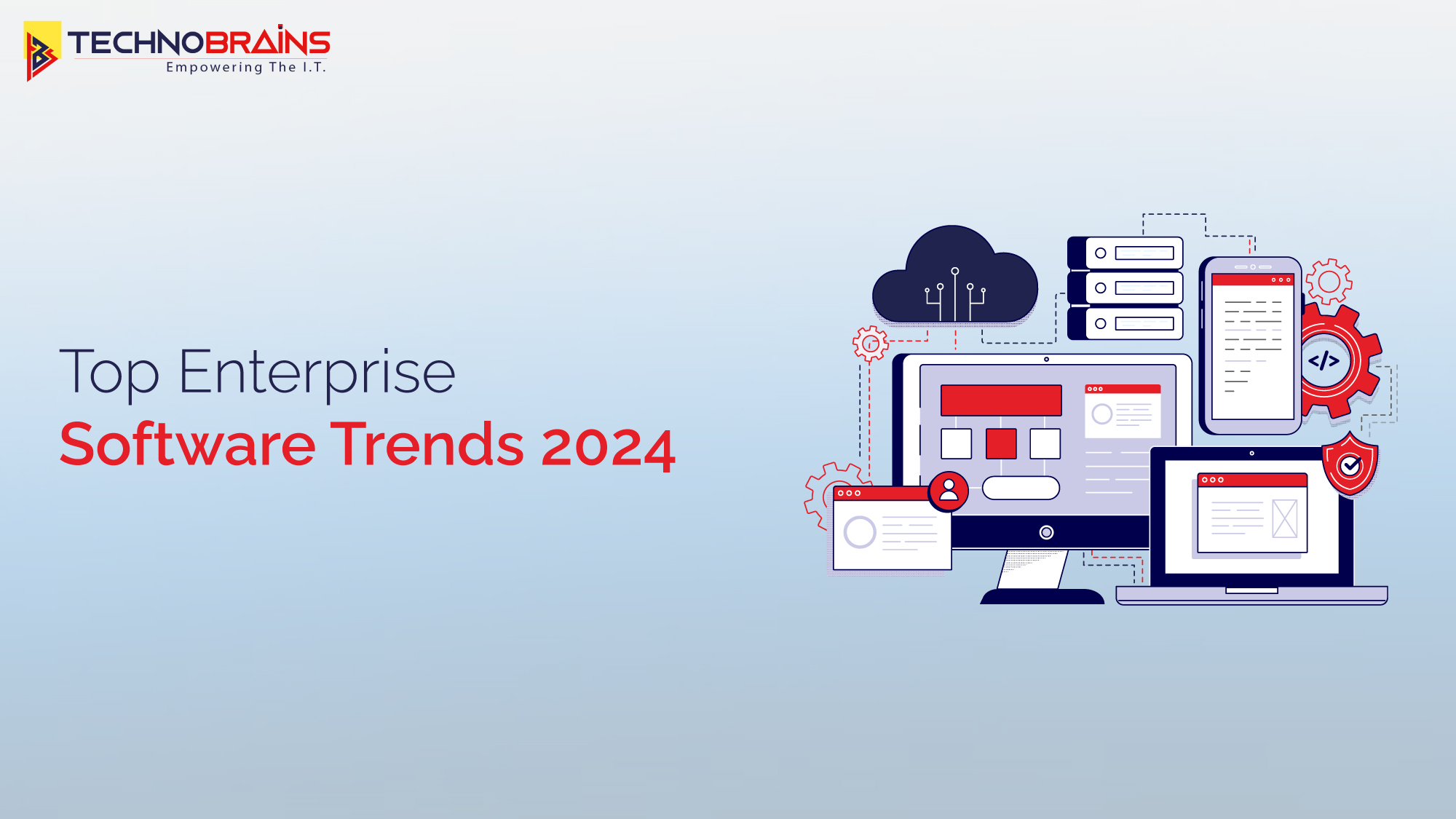2024 will witness a technological breakthrough in designing, developing, and deploying enterprise software. Enterprise software applications help pave the way to enhanced operational efficiency, streamline complex processes, and drive sustainable growth, making them essential and a necessity for organizations today.
According to Statista, the enterprise software market is about to reach $376.40 billion by 2028, with a growth rate of 6.55% starting in 2024. Given the numbers, it is hardly a surprise when we predict it will only continue to grow as organizations adopt and standardize enterprise software development.
However, for businesses to stay on top of the market, it is important to keep a continuous pace besides adopting new technologies. And for that, you must take a look at these five enterprise software development trends that will help you stay updated.
Read Also, Software Development Trends 2023 Explained With Benefits
Top 5 Enterprise Software Trends in 2024

1. Artificial Intelligence and Machine Learning
Artificial intelligence and machine learning are among the biggest innovative trends in the growing technological era. Both AI & ML hold the potential to completely simplify business operations, improve decision-making capabilities, automate complex tasks, and identify malicious threats. For instance, cybersecurity firms would greatly benefit from AI integration, as it can quickly analyze critical threats and spot suspicious activities.
Chatbots are often the best example of what can be achieved with machine learning. With the help of chatbots driven by machine learning, users can have instantaneous interactions and easily get the answers to their questions. Machine learning algorithms can improvise, learn, and adapt based on the user’s input, significantly improving their experience. As another example, social media platforms such as Facebook, Instagram, and Threads have the ‘People You May Know’ feature, where the algorithm personalizes recommendations based on your contacts.
2. Cloud Computing
Cloud computing involves the provision of IT services like storage, servers, networks, and software applications over the Internet. In today’s environment of remote work, where businesses look for flexibility and dependability, cloud computing is truly an innovative stride in enterprise software.
Firms of all sizes utilize cloud computing to store and protect crucial data, as well as to digitally transform their organizational processes. Prominent examples of cloud computing providers that can house entire business IT infrastructures over the Internet include Google Cloud Platform, Microsoft Azure, and AWS.
3. Human Augmentation
The cutting-edge concept of “human augmentation” makes use of many technologies, including MR, VR, and AR, and is revolutionizing the way organizations operate. Several businesses, including “healthcare,” “manufacturing,” and “retail,” may derive benefit from it. In the healthcare industry, for instance, augmented reality allows professionals to practice performing delicate surgical procedures in simulated conditions. By crafting intuitive experiences, businesses can leverage human augmentation to generate virtual training settings and real-life situations to keep their personnel involved and boost productivity.
4. Robotic Process Automation (RPA)
Robotic process automation is considered one of the key enterprise software trends that has had an immense impact on modernizing organizations. RPA enables businesses to bring about increased levels of efficiency in their operations. Not only in IT sectors, but robotic process automation also finds multifarious applications across industries. It is considered a basic need in every organization, as it helps automate workflow, extract data, and improve overall efficacy. For example, some e-commerce-based organizations use RPA to automatically process customer orders, reducing the amount of time spent manually handling them.
5. Blockchain
Blockchain technology is one of the biggest trends uncovered in recent years. It enhances security, transparency, and effectiveness across various business operations. Blockchain serves as a decentralized, secure ledger that makes it possible for numerous users to share and validate crucial information. For instance, banks and other financial organizations are using blockchain platforms to streamline international payments with shortened processing times while retaining the highest level of security.
Conclusion
In conclusion, enterprise software trends will have a major impact on every industry. Any organization can grow and enhance its potential with the help of these latest trends. In the era of digitalization, where brands, communication, and technologies merge, businesses should keep themselves up-to-date with these innovative trends. By implementing them in their enterprise software development projects, they can deliver exceptional consumer services, set themselves up for success, and guarantee their viability in the future.
If you seek a reliable partner who can help you capitalize on the many potential benefits of these innovations, don’t look any further than TechnoBrains. As a leading enterprise software development company, we can help you with this and a lot more. Get in touch with us right now!









